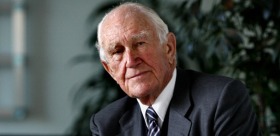Member for Wannen, 1955-198
There was a great deal more to John Malcolm Fraser than the controversial dismissal of Gough Whitlam’s Government in 1975. Whilst that divisive and exceptional landmark in the Australian political landscape is seared forever in the memories of most who lived through it, paradoxically the good works of the 22nd Prime Minister of Australia are largely forgotten.
He entered the House of Representatives in 1955 aged just 25, the youngest Member of Parliament, becoming a cabinet minister in 1966 and Opposition leader in 1975. We perhaps recall Fraser as Minister for the Army, sending conscripts to Vietnam, but how many of us are aware that, after that conflict, his government accepted 56,000 Vietnamese refugees and they were officially described as “boat people”, not illegal entrants. These Vietnamese represented just part of the 200, 0000 Asians who came to our country while Fraser was Prime Minister, marking the end of the long-running White Australia Policy.
Although his public persona was of an aloof, born-to-rule landed patrician, popularly likened to an Easter Island stone statue, his fierce opposition to racial and ethnic intolerance, and an enduring humanitarian streak always underpinned his policies. His government was responsible for establishing the Australian Human Rights Commission, Freedom of Information, the SBS, the Australian Institute of Sport, The Federal Ombudsman and the Australian Federal Police. Fraser was a consistently strong opponent of Apartheid and the white minority Ian Smith Government in Rhodesia, He also continued the Whitlam Government’s reforms for aborigines guaranteeing land rights and self-government for the Northern Territory
After 22 years in Parliament, and his defeat, in 1983 by the resurgent Australian Labor Party under newly-minted and charismatic leader Bob Hawke, Fraser returned to the family property, Nareen, but he didn’t retire from public service. In 1987 he set up, and for many years chaired CARE Australia and he continued to advocate human rights from his position as chair of the Commonwealth Eminent Persons Group.
With the passage of time it became increasingly apparent that Fraser had much more in common with his former political opponent Whitlam than with his own side of politics. Both shared a vision of Australia of a strong, independent nation, not subservient to the US, and welcoming China’s emergence as an international powerhouse.
And even on environmental issues Fraser was a conservationist well ahead of his time. He infuriated the then Queensland Premier Joh Bjelke-Petersen by banning sandmining on the world’s largest sand island, Fraser Island, paving the way for World Heritage listing in 1981 and, in a similar departure from traditional conservative priorities and policies, he banned oil exploration on the Great Barrier Reef. Little surprise then that he appeared on the same platform as the Greens Senator Sarah Hanson-Young to endorse her re-election in 2013. Fraser was his own man and uninhibited in speaking his mind.
Domestically, he was reconciled with his former political foe Gough Whitlam and increasingly outspoken in his criticism of both sides of Australian politics, but especially his old party and his successors, Prime Ministers John Howard and Tony Abbott. This culminated in his very public resignation from the Liberal Party in 2009.
Those of us who observed the public face of John Malcolm Fraser, witnessed the unusual metamorphosis of an economic rationalist and ruthless politician into one of the last of the small ‘l’ Liberals. A complex and conflicted man who, perhaps, shone most brilliantly in his post-parliamentary days.
Although a cliché, he was a ‘towering presence’ on the public stage, both during and after leaving politics. He embodied and advocated some ‘old fashioned values’ and Australia is poorer for his passing and the loss of his resonating, authoritative voice of reason and tolerance.
Karl Wofenden of Invocare
“When a leading figure, such as a former prime minister, dies, it can feel like the end of an epoch, especially when their public life was a period of high change. Also, with public life comes public profile so, often, a leading figure becomes part of our cultural backdrop. While we did not know them personally, they have had an impact in our lives and we can still feel a connection to them long after their influence subsides. Remembering them, in a way, is also remembering our former selves. Honouring them can feel like honouring a part of ourselves too.”

